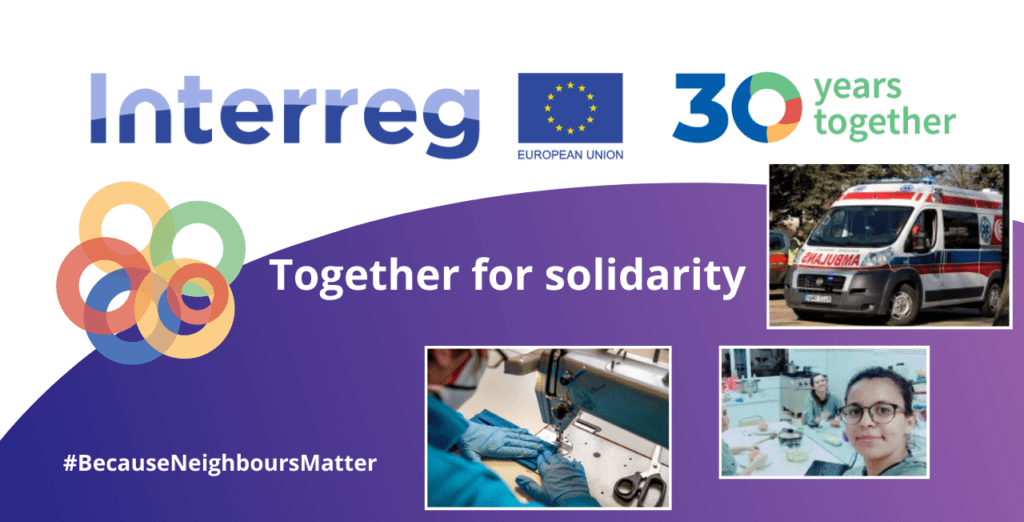Interreg 30: when celebration turns to solidarity
Turning celebration into solidarity, showing that cooperation is even more vital in times of crisis: this is what is happening to the Interreg 30 campaign, an initiative born to mark the 30th anniversary of European cooperation across cities, regions and countries.
As everything else, the campaign was swamped by the COVID-19 pandemic, compelling to a quick adjustment of tone and content. Because isolation might be the word of 2020, but Europe remains defined by the notion of community. And if the idea that forces should be joined to better tackle challenges is at the heart of the European spirit, more than ever this is the time to pursue such spirit. From 9 of May – Europe’s birthday – to the beginning of September, the purpose is to switch fireworks for past achievements off, and to highlight present response to new trials. “Interreg 30 is a campaign willing to emphasize the value of cooperation, which implies a lot more than pure financing – explains Astrid Aulnette, communication officer in DG REGIO unit Macro-regions, Transnational/Interregional/External Cooperation, Enlargement – it is about interaction between people, exchange of knowledge, sharing of good practices. We wanted to celebrate such value, but the emergency has brought new priorities in: people were and still are dying, losing their jobs, facing unmatched distress. We had to cope with this fact, to adjust our tone, and to show that cooperation is a valuable tool even more in times of troubles”.
The original campaign was supposed to articulate around three main topics, emphasizing the importance of neighbourhood to find common solutions to common problems, stressing the positive impact of a green and resilient environment, underscoring youth development as an essential drive for the society of the future. With the expanding of the global pandemic, the focus on health and economic support have become predominant: a choice made in line with the ongoing priorities linked to the emergency. “Although the competences for the health sector are reserved to Member States – explains Astrid – for many years regional policy has considered health a crucial aspect of cross border cooperation, financing projects to support frontiers’ medical staff in their joint efforts to work together, to share equipment, to do research. All of this was somehow preparatory to what we are witnessing today”. “As for the assistance to economic recovery – continues Astrid – funds for cohesion policy have always supported the growth of small and medium size enterprises, which are badly suffering from the COVID-19 disaster. This work will continue, always with an eye to sustainable development, not to waste progresses made so far in the environmental field”.
With the aim to restrict the spreading of the virus, events and gatherings originally planned to celebrate Interreg 30 have been cancelled or postponed, and a broad digital campaign has momentarily replaced foreseen activities. DG REGIO communication channels have raised awareness of how cooperation can be a real lifesaver: not only the EU has funded all kinds of emergency medical equipment allowing monitoring and treatment of COVID patients from Poland to Spain, from Italy to Albania, and even throughout Belarus and Russia; projects have also supported front line hospitals, health laboratories, companies producing 3D printers to make reusable masks. A single, united, across-borders effort to face the crisis, from the South to the North. “Just to give you two very different examples, one of the ENI CBC projects, TEXMED, is matching textile producers and users to support supply chain of coveted textile sanitary materials for production of health garments – continues Astrid – In the Artic, a project under the Interreg Northern Periphery and Arctic programme has managed to create a network of medical personnel across remote and quite inaccessible spaces, with very modest populations scattered along an immense territory”.
As the pandemic is slowly retreating, from September the Interreg 30 campaign should go back to the original and to the 3 foreseen topics, which will be even more relevant in a post-crisis context. Many events are already being scheduled, from a meeting at the Parliament (9 September) to the Cooperation Day at the Berlaymont in Brussels (21 September), to the Green Week in October, and the Macro Regional Strategies fora in October and December. A particularly valuable occasion will be the European Week of Regions and Cities, the biggest European networking event on regional and urban policy, to take place in mid-October. Plans are ongoing, but a virtual setting is also being considered: the global killer is not defeated yet.
Follow #Interreg30 campaign on social media channels!
